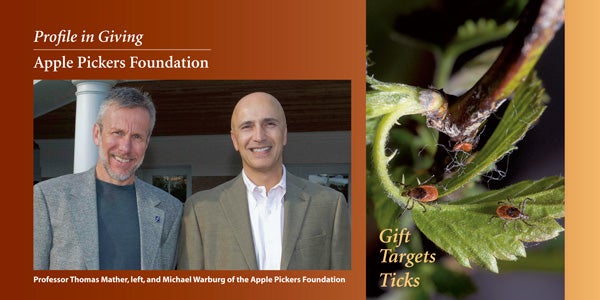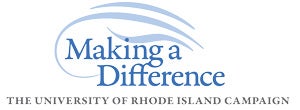Apple Pickers Foundation

A Westerly, R.I., charitable foundation recently provided some much needed support for URI’s nationally recognized tick-bite protection and disease prevention research and outreach program. The $100,000 gift from the Apple Pickers Foundation came just in time for what URI Entomology Professor Thomas Mather predicts will be “a big, big year for tick transmitted infections, including Lyme disease.”
Representing the small private foundation, Michael Warburg ’96, who earned a master’s in accounting, commented that “we’ve been keenly interested in the Lyme disease field and have been looking for ways to help address this serious public health problem. We observed that while there is funding available for research, there is a critical lack of focus on awareness and public health education. It was with this in mind that Dr. Mather’s work became a compelling proposition for us.”
|
|
In mid-2006, Mather and his team launched an aggressive health information and decision support campaign aimed at helping people take appropriate actions to prevent tick bites and disease. URI’s Tick Encounter Resource Center has become one of the nation’s best sources of information on preventing disease-causing tick bites, and the Apple Pickers gift will help develop several new, interactive decision support tools available on the center’s Web site, tickencounter.org.
“This very generous gift will greatly advance our efforts to raise people’s consciousness about avoiding tick bites and encourage people to take just a few simple but effective actions to prevent tick bites and disease,” said Professor Mather. “Tick transmitted diseases like Lyme disease, babesiosis, and anaplasmosis can be devastating. In Rhode Island, Lyme or one of the other infections probably already has struck someone you know. One tick bite can change your life,” Mather explained, “and the Apple Pickers Foundation gift will truly make a difference to the health of people in Rhode Island and beyond.”
Warburg learned of URI’s innovative tick-bite prevention program through its engaging on-line outreach tool. A month later, he and his wife attended a 2007 Tick Control Awareness Day event at Roger Williams Park where the URI team demonstrated the effectiveness of permethrin tick repellents on clothing. “It was very convincing watching those tiny nymphal ticks fall off the clothing of Stephanie Chafee, one of last year’s event co-chairs,” Warburg said. “The only sure way to avoid Lyme disease is to prevent tick bites—a message that needs to be clearly conveyed to those at risk.”

For more information on the many giving opportunities at the University of Rhode Island, please visit our Web site at urifoundation.org, or contact Gayle Johnson, associate vice president for development, URI Foundation, 79 Upper College Road, Kingston, RI 02881-2023. Phone: 401-874-5836.
Photos by Michael Salerno
 Home
Home Browse
Browse Close
Close Events
Events Maps
Maps Email
Email Brightspace
Brightspace eCampus
eCampus


